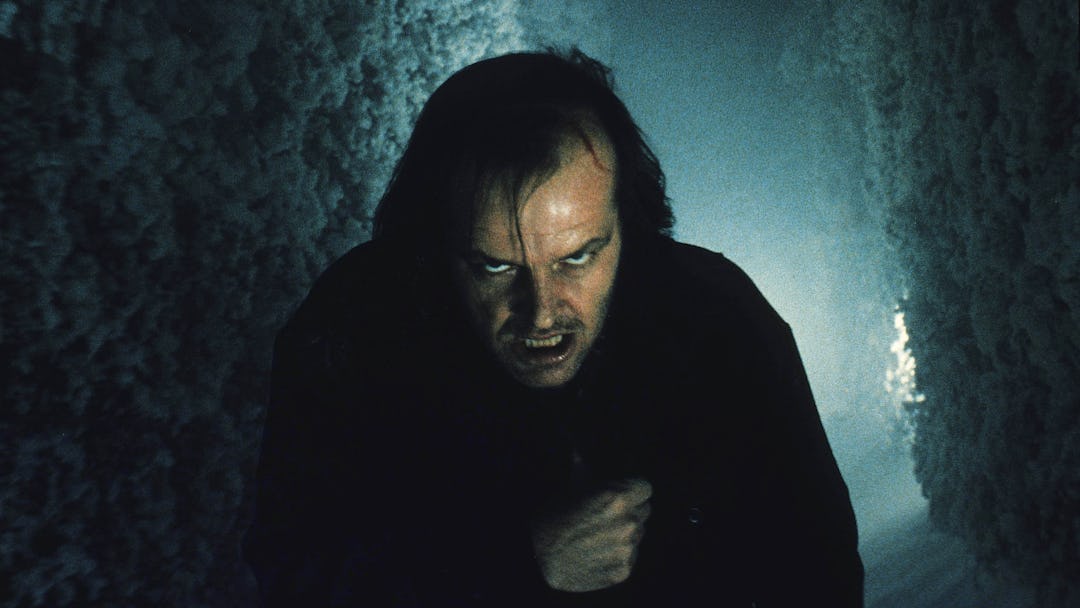Well, here we go again. Stephen King recently published Doctor Sleep, the sequel to The Shining, and so we’re again asking what he thought of Stanley Kubrick’s film adaptation of the original book. And the answer, as ever, is not much . He’s voiced these objections before, in previous interviews and essays; he disliked Kubrick’s take on the property so much, in fact, that he co-produced and wrote a mini-series “do over” in 1997. (It was not well regarded.) This latest round of niggling was swiftly shot down by Kubrick defenders as the carping of a jealous, inferior artist; over at Salon, Laura Miller fires back, arguing that King’s claims of misinterpretation are correct. Almost point for point, she’s right — Kubrick’s film is not a good adaptation of King’s work. But it’s also a great film, so the quality of the adaptation is patently irrelevant.
To get at this properly, let’s take Kubrick and King, two genuine artistic geniuses about whom temperatures tend to run a little high, off the table. Instead, let’s look at a decidedly less hallowed book and film: The Firm. John Grisham’s 1991 breakthrough novel was a perfectly serviceable beach-and-airplane read, but when Sydney Pollack came on board for its film adaptation, he realized he had taken on the job of making a movie out of a book where the big third-act climax was centered on photocopying, and where his hero ends up stealing $10 million and disappearing to the islands — not exactly a Tom Cruise-friendly resolution.
So he and his all-star team of screenwriters (Chinatown’s Robert Towne, Hurlyburly’s David Rabe, and Three Days of the Condor’s David Rayfiel) cooked up a new narrative hook — nabbing the firm for mail fraud — and rewrote the entire third act, with a thrilling chase scene and suspenseful diversion provided by our hero’s wife. It was, any way you slice it, a lousy job of transplanting Grisham’s pages to the screen. But it made for a far more satisfying movie than a direct, faithful, word-for-word adaptation ever could have.
And the reason is simple: because the printed word and the filmed image are two very different things, and serve two far removed masters. Sure, you can compare the book and film versions till the cows come home — and believe you me, we’ve done plenty of that — but it’s ultimately an apples-and-sneakers comparison. (“Apples and oranges” is a stupid expression. You can totally compare apples and oranges. They’re both delicious fruits.) And The Shining is actually a highly instructive example of those differences.
In his recent BBC interview, King complains that Kubrick’s film was “cold. I’m not a cold guy. I think one of the things people relate to in my books is this warmth, there’s a reaching out and saying to the reader, ‘I want you to be a part of this.’ With Kubrick’s The Shining I felt that it was very cold, very, ‘We’re looking at these people, but they’re like ants in an anthill, aren’t they doing interesting things, these little insects.’” He also notes that Jack Nicholson’s portrayal of Jack Torrance wasn’t the slowly developing madman that he’d written, but instead someone who was “crazy from the jump.”
All valid points. And in defending King, Salon’s Miller accidentally makes the more interesting point: “The two men represent diametrically opposed approaches to creating narrative art. One is an aesthete and the other is a humanist. Kubrick was a consummate and famously meticulous stylist; King’s prose is workmanly and his novels can have a shambolic bagginess.” Exactly right; King’s great novels work because they put us into the heads of his characters, because they convey psychological as well as external struggles, because their inner monologues can pour forth out of his prose. It’s part of what makes him a great writer. It’s also why there have been so many lousy films based on Stephen King books — because all of that is lost in the translation. And Kubrick would have been a lousy novelist, his meticulous detachment resulting in, we could presume, some pretty turgid and lifeless writing. But luckily, he was a filmmaker, and his gifts as an aesthete are what made him such a singularly fine one.
This is not to say that the kind of intensely internal storytelling King desired can’t be done onscreen (it can, though not nearly as effectively on the page), but this was not Kubrick’s forte. For the record, complaining about a Kubrick film being cold is kinda like complaining about a Scorsese picture being violent or a Tarantino movie having too many bare feet. It’s what they do. And this was not a new style he sprung on everybody with The Shining; it was his well-established modus operandi, so if King didn’t think he was the right guy for the job, he probably should have voiced his concern earlier on. (I’m willing to bet his grave reservations about the film aren’t stopping him from cashing the residual checks.)
“In Kubrick’s film,” Harris writes, “Jack’s madness becomes that of an imperious auteur, convinced of his own importance, running amok and seeking to wipe out the mere human beings whose inconvenient presence muddles his vision. That two such different men as King and Kubrick were able to see themselves in this character indicates what a remarkable creation Jack Torrance is.” In other words, in adapting The Shining, Kubrick took King’s story and King’s character, and made it his own. Kubrick’s obligation to King was not to make a book report — it was to make an effective movie, one that worked on its own terms. This is, above all else, the job of the cinematic storyteller, fidelity to source material be damned.
